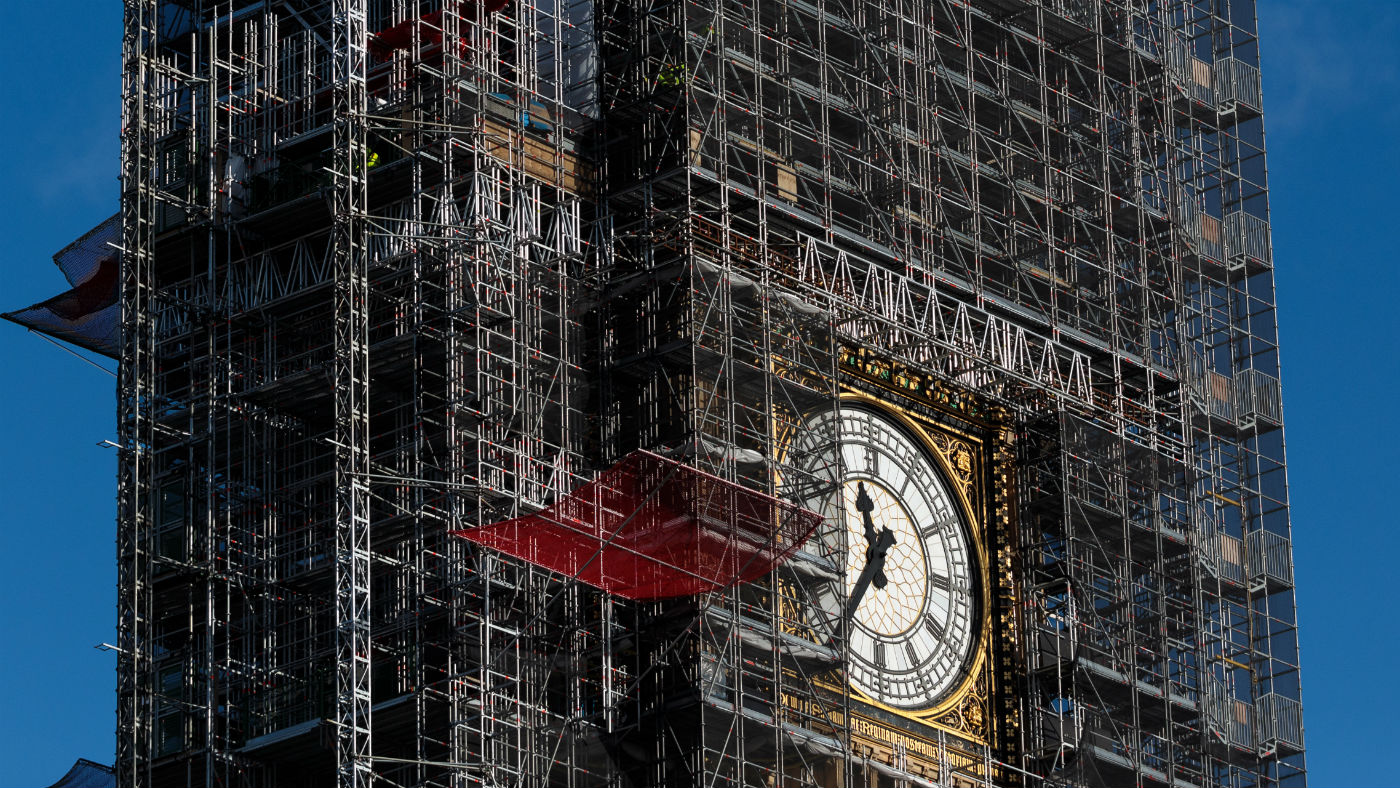What will Parliament repairs cost - and where will MPs go?
Minsters have voted to vacate Westminster for major restorations

A free daily email with the biggest news stories of the day – and the best features from TheWeek.com
You are now subscribed
Your newsletter sign-up was successful
MPs have voted to move out of the Palace of Westminster while much-needed restoration work is carried out.
Ministers had proposed setting up a committee to assess whether MPs and peers should move out of the Houses of Parliament, effectively delaying a final decision, but on Wednesday the Commons narrowly passed a cross-party amendment in favour of a “full and timely decant”.
What is the problem?
The Week
Escape your echo chamber. Get the facts behind the news, plus analysis from multiple perspectives.

Sign up for The Week's Free Newsletters
From our morning news briefing to a weekly Good News Newsletter, get the best of The Week delivered directly to your inbox.
From our morning news briefing to a weekly Good News Newsletter, get the best of The Week delivered directly to your inbox.
Experts have long claimed the Palace of Westminster is crumbling into ruin. They argue that the building was never designed to house the 7,500 people currently working in it, who are joined by more than a million visitors a year.
The greatest causes for concern are the plumbing and wiring, some of which has not been replaced since the construction of the building was completed in the 1870s, reports CNN.
Officials say the Palace is at risk of a “catastrophic failure” such as a flood or fire because the plumbing and electrical infrastructure is “no longer fit for purpose”.
Work is also needed to repair crumbling stonework, remove asbestos, restore 4,000 windows and repair damaged roofs, says The Independent.
A free daily email with the biggest news stories of the day – and the best features from TheWeek.com
Opening this week’s debate, Andrea Leadsom, the Leader of the House, said that while Parliament remains “structurally sound”, the risk of fire is now “critical”. More than 60 incidents in the past ten years could have caused serious harm, she said.
Former cabinet minister Damian Green said it was not a “wild exaggeration” to say that Parliament is a “death trap”.
When will the move happen and how much will it cost?
Although Wednesday’s vote was a big step forward, the move from the Palace of Westminster will require a full Act of Parliament and is unlikely to happen until 2025.
It will be the first time either House has moved out of the Victorian-era Palace since the Commons chamber was destroyed by a bomb in 1941.
The MPs’ departure will reduce the cost of the repairs, but the bill remains substantial. Deloitte estimates that the work will cost taxpayers between £3.5bn and £3.9bn and will take about six years.
What else could be done?
Alternative options included a partial move, which would see the Commons and Lords move out one after the other, and would have cost an estimated £4.4bn over 11 years. This was rejected as too slow, too expensive and too disruptive to Parliamentary business.
Another proposal, costing £5.7bn over 35 years, would have allowed both Houses to remain in situ, but was dismissed on similar grounds.
Sky News says the so-called “decant” was “bitterly opposed” by a large group of veteran MPs - mostly Conservatives - who proposed an amendment that would have kept the Commons inside the Houses of Parliament.
Younger MPs told Sky News the older MPs are motivated by self-interest and simply do not want to serve the final years of their political careers in temporary accommodation.
“Downing Street also favoured delaying the decision,” says The Guardian, although one source claimed Theresa May had previously expressed concerns about health and safety issues and had argued for a full decant.
In a bid to appease some MPs and peers, Leadsom promised new legislation that would guarantee a return to the Palace after work had been completed, “aimed at addressing fears they will never return to the historic building”, says The Sun.
What about a permanent move away?
Some commentators, including the Daily Mirror’s politics editor Jason Beattie, have advocated abandoning the Palace for good and moving to a new building that “reflects modern Britain”.
Arguing that the renovation will cost the equivalent of four London Shards, or almost six hospitals at £300m each, Beattie proposes instead building a new House of Commons chamber with modern facilities, sufficient office space and decent plumbing. “If you were truly adventurous, you could ditch the adversarial design of the current chamber and introduce a horse-shoe shape that promotes a more inclusive, consensual style of politics,” he adds.
David Linden, SNP MP for Glasgow East, has also argued for a permanent move away from Westminster.
Speaking to BT News, he said the refurbishment offers a chance to move out of the “Westminster bubble”, with the current site turned into a museum and a new “modest” parliament developed in the Midlands.
“You can’t have absolutely everything just concentrated in this small corner of the UK,” Linden said. “If you’re truly going to be a kingdom of equals then start spreading some of the jobs and power about a wee bit.”
However, an SNP amendment floating a permanent move away from Westminster was soundly rejected by MPs.
Where will MPs go?
While several alternative locations have been touted in the past, including a futuristic chamber that would sit on the Thames, cost and practicality issues mean a site will have to be found within the area around the Palace of Westminster.
The most likely scenario is that MPs will move to Richmond House, in Whitehall, currently home to the Department of Health and Social Care, while peers could use the Queen Elizabeth II Centre, a conference facility just off Parliament Square.
-
 The ‘ravenous’ demand for Cornish minerals
The ‘ravenous’ demand for Cornish mineralsUnder the Radar Growing need for critical minerals to power tech has intensified ‘appetite’ for lithium, which could be a ‘huge boon’ for local economy
-
 Why are election experts taking Trump’s midterm threats seriously?
Why are election experts taking Trump’s midterm threats seriously?IN THE SPOTLIGHT As the president muses about polling place deployments and a centralized electoral system aimed at one-party control, lawmakers are taking this administration at its word
-
 ‘Restaurateurs have become millionaires’
‘Restaurateurs have become millionaires’Instant Opinion Opinion, comment and editorials of the day
-
 How corrupt is the UK?
How corrupt is the UK?The Explainer Decline in standards ‘risks becoming a defining feature of our political culture’ as Britain falls to lowest ever score on global index
-
 The high street: Britain’s next political battleground?
The high street: Britain’s next political battleground?In the Spotlight Mass closure of shops and influx of organised crime are fuelling voter anger, and offer an opening for Reform UK
-
 Is a Reform-Tory pact becoming more likely?
Is a Reform-Tory pact becoming more likely?Today’s Big Question Nigel Farage’s party is ahead in the polls but still falls well short of a Commons majority, while Conservatives are still losing MPs to Reform
-
 Taking the low road: why the SNP is still standing strong
Taking the low road: why the SNP is still standing strongTalking Point Party is on track for a fifth consecutive victory in May’s Holyrood election, despite controversies and plummeting support
-
 What difference will the 'historic' UK-Germany treaty make?
What difference will the 'historic' UK-Germany treaty make?Today's Big Question Europe's two biggest economies sign first treaty since WWII, underscoring 'triangle alliance' with France amid growing Russian threat and US distance
-
 Are free votes the best way to change British society?
Are free votes the best way to change British society?Today's Big Question On 'conscience issues' like abortion and assisted dying, MPs are being left to make the most consequential social decisions without guidance
-
 Is the G7 still relevant?
Is the G7 still relevant?Talking Point Donald Trump's early departure cast a shadow over this week's meeting of the world's major democracies
-
 Angela Rayner: Labour's next leader?
Angela Rayner: Labour's next leader?Today's Big Question A leaked memo has sparked speculation that the deputy PM is positioning herself as the left-of-centre alternative to Keir Starmer